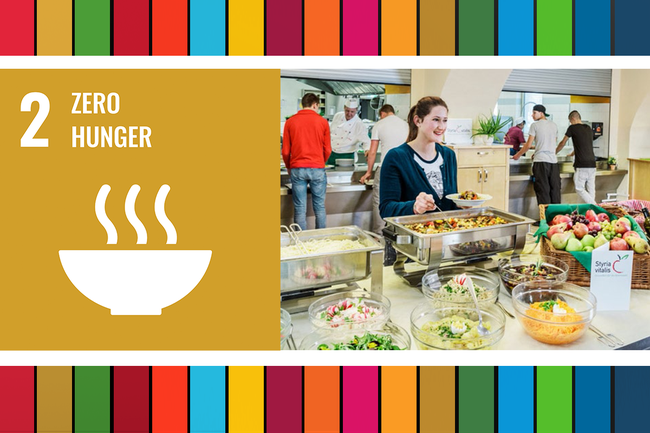SDG 2 Zero Hunger: Sustainable Food System
In the second post of the SDG topic series, Senior Researcher Ursula Trübswasser shares insights into her research.
Senior Researcher Ursula Trübswasser on her research into plant-based community catering
How regional projects have global impacts
Hundreds of millions of people worldwide continue to suffer from hunger, while at the same time, huge amounts of grain and soy do not make it to their plates but end up as fodder for the production of animal-based products. This clearly shows: Our food system needs to change.
Why plants make all the difference
A more plant-based nutrition uses resources much more efficiently and is healthier at the same time.
- The production of one kilogramme of meat takes 10x more energy than the production of plant-based food with the same nutritional value.
- Less meat consumption means less land usage, lower greenhouse gas emissions, and more cultivation area for foods that end up directly on the plate.
- On a global scale, the amount of grain used as animal feed and as food for people is approximately the same.
- A plant-based diet can – due to the higher intake of fibre, vitamins, minerals, and antioxidants as well as the lower intake of saturated fats and cholesterol – help to reduce the risk of chronic diseases.
- Experts agree that a plant-based diet is not only healthy, but also a key element in the global fight against hunger.
Our contribution: “Flora wächst“
With the project “Flora wächst – Wendepunkt für eine pflanzenbasierte Gemeinschaftsverpflegung“ (turning point for a plant-based community diet), we want to put this idea into practice. Together with businesses that carry the Styrian seal „Grüner Teller“ (green plate), Styria vitalis is working on firmly anchoring a plant-based diet in community catering. The St. Pölten UAS is researching how to improve the acceptance for these foods in society. As scientific partner, the team headed by Ursula Trübswasser is trying to find out which challenges and chances businesses experience when switching to a more plant-based community diet, and is collecting best practice examples for how to improve the acceptance for plant-based foods.
Think globally – act locally
Even if local projects such as this alone cannot solve the problem of global hunger, they still send a strong signal for responsible and sustainable food systems and they clearly demonstrate that change is possible. To this end, the collected best practices of “Flora wächst” and similar projects serve as facilitators for further initiatives and projects on the path towards a more sustainable food system.
About the SDG Series
As part of our SDG series, we explore one of the 17 Sustainable Development Goals each week. The featured contributions highlight how St. Pölten University of Applied Sciences actively supports a sustainable future. Topics range from tackling old-age poverty and advancing AI for Green to fostering strategic partnerships and networks.

